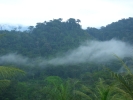 The NGO Brainforest, in collaboration with FERN and WRM, has conducted a study on the impacts of the expansion of oil palm and rubber tree plantations in Gabon. Tropical rainforests cover 85% of the total land area in Gabon. They are home to an immense diversity of species, on which some 300,000 people depend for their survival, through hunting, gathering, fishing and small farming.
The NGO Brainforest, in collaboration with FERN and WRM, has conducted a study on the impacts of the expansion of oil palm and rubber tree plantations in Gabon. Tropical rainforests cover 85% of the total land area in Gabon. They are home to an immense diversity of species, on which some 300,000 people depend for their survival, through hunting, gathering, fishing and small farming.
The gabonese government wants to turn the country into Africa’s largest producer of palm oil. Under the “Strategic Plan for an Emerging Gabon” (Plan Stratégique Gabon Emergent, PSGE) of the President, two companies will develop oil palm and rubber tree plantations: the Singapore-based Olam and the Belgium-owned SIAT Gabon.
The local population in the areas affected by the plantations as well as other interested parties have not been informed of the terms and conditions of the agreements signed between the government and the companies. When the government grants land concessions without precisely delimiting those lands, it leads to heightened insecurity and conflicts with communities.
The expansion of large-scale plantations will further aggravate the food insecurity already suffered by the general population, whether as a result of the loss of land and deforestation, or due to the fact that when farmers go to work for the oil palm and rubber tree plantation companies, their fields are not properly maintained. A resident of Doubou in the region of Mouila said: “This forest allows us to survive and we do not want to share it. If we cannot plant food, fish or hunt, how are we going to survive?” The decrease in food production threatens the food sovereignty of the population of a country that currently needs to import most of its food.
In addition, local communities are also concerned over access to water in the future. Although water is, in principle, a public good, they are greatly worried by the growing private ownership of lands and forests, deforestation, and the expansion of rubber tree and oil palm plantations, and the potential impacts of these on the water supply.


